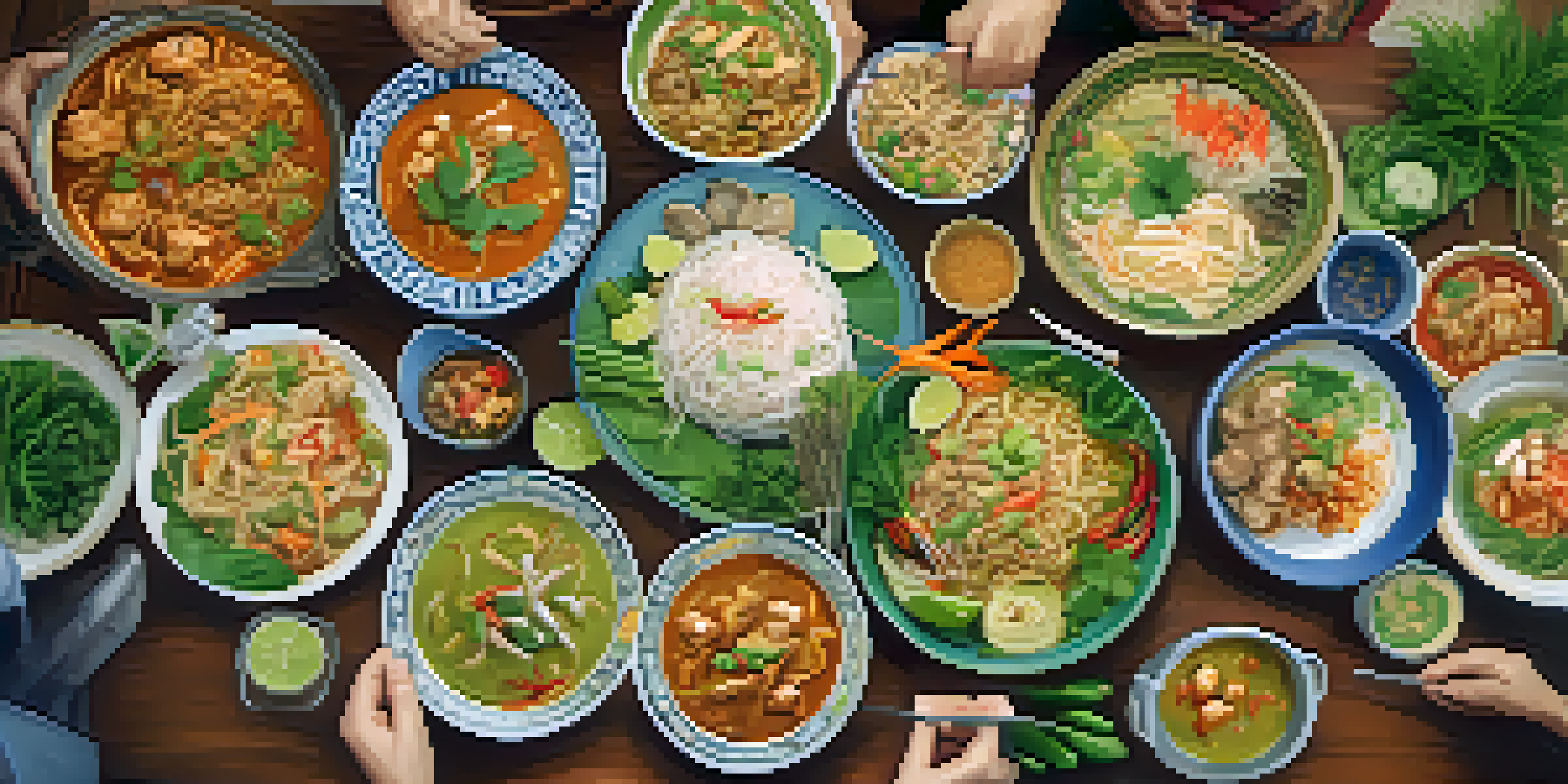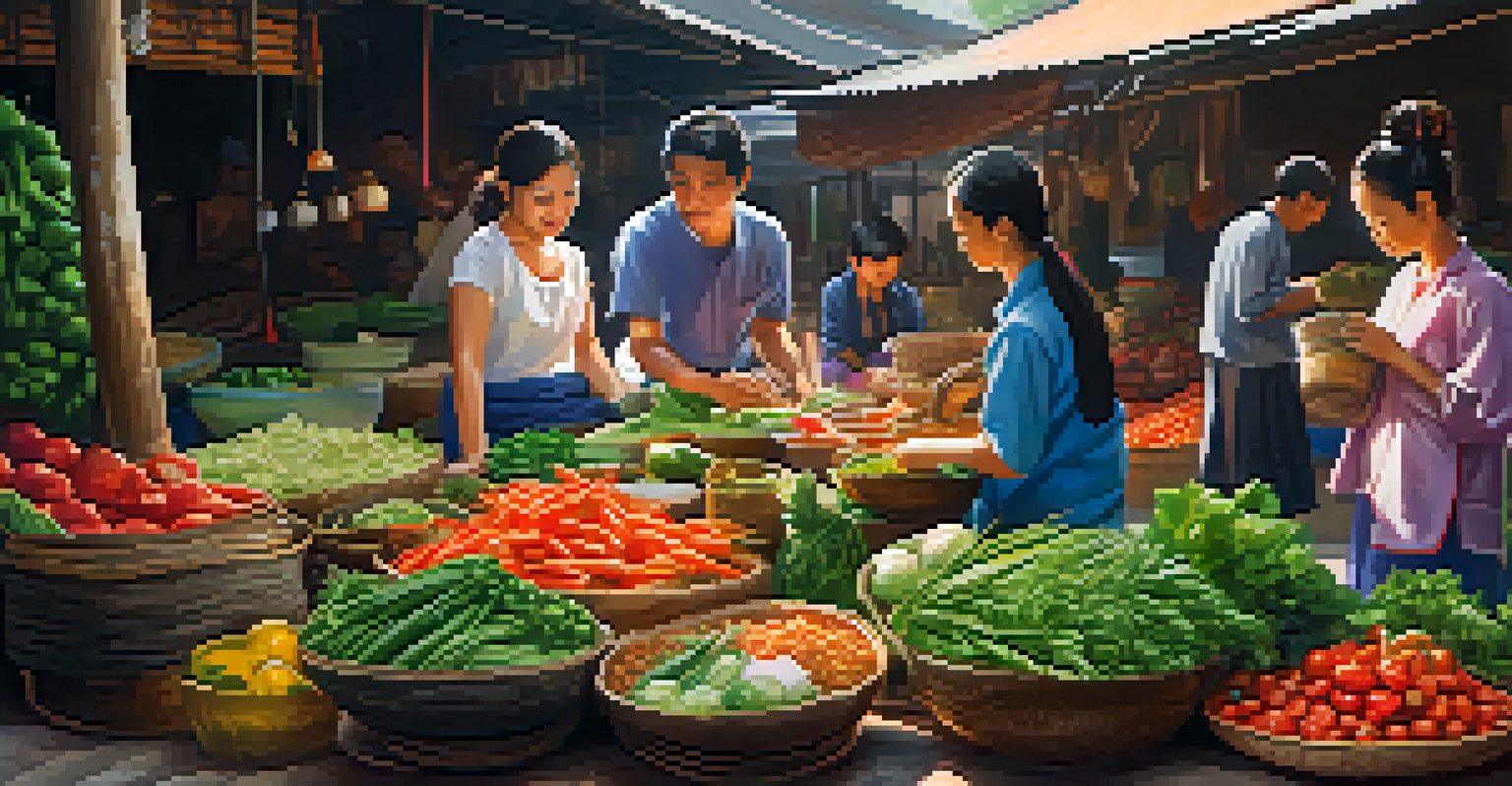Participating in Family Meals: A True Thai Experience

Understanding the Importance of Family Meals in Thailand
In Thailand, family meals are more than just a chance to eat; they're a cherished tradition that reinforces bonds. Meals are often communal, with everyone sharing from a variety of dishes, making the act of eating a collective experience. This practice highlights the Thai values of togetherness and respect, where food is seen as a way to nurture relationships.
The family is one of nature's masterpieces.
The importance of family meals is deeply rooted in Thai culture, reflecting a philosophy that emphasizes harmony and community. It's not uncommon for families to gather daily, especially during festive occasions, to enjoy a spread of delicious dishes. This ritual fosters an environment where stories are shared, laughter rings out, and connections are strengthened.
In a world where fast-paced living often takes precedence, the Thai approach to family meals serves as a reminder of the joy found in togetherness. It’s a moment to pause, appreciate one another, and savor the flavors of life, making it a central aspect of Thai family dynamics.
Traditional Dishes That Bring Families Together
No family meal in Thailand is complete without an array of vibrant dishes that appeal to all senses. Signature dishes like Pad Thai, Tom Yum, and green curry are often featured, each representing a blend of flavors that reflect the region's culture. These meals are usually accompanied by jasmine rice, which acts as a staple, bringing balance to the meal.

Thai cuisine is renowned for its ability to cater to various tastes, making it perfect for family gatherings. Whether someone prefers spicy, sweet, sour, or salty, there's always something for everyone. Sharing these diverse dishes allows family members to explore and appreciate flavors together, creating a memorable culinary experience.
Family Meals Foster Connection
In Thailand, family meals are a cherished tradition that strengthen bonds and promote togetherness among loved ones.
Additionally, the presentation of these dishes often sparks excitement at the table. Colorful platters filled with fresh herbs, vibrant vegetables, and fragrant spices invite everyone to dig in, transforming the meal into a feast for both the eyes and the palate.
The Ritual of Preparing a Family Meal
Preparing a family meal in Thailand is a collaborative effort that brings everyone together in the kitchen. From chopping vegetables to stir-frying aromatic spices, each family member usually has a role to play, fostering teamwork and connection. This not only makes cooking more enjoyable but also instills a sense of pride in the meal being created.
There is no greater power than a community discovering what it cares about.
The process often starts with a trip to the local market, where fresh ingredients are selected. This outing can be a family adventure, as members discuss what dishes to prepare and choose the best produce, embodying the communal spirit that defines Thai culture. The excitement builds as everyone anticipates the flavors that will soon fill their home.
Once back in the kitchen, the air fills with tantalizing aromas, and laughter mingles with sizzling sounds. This collaborative cooking experience enhances relationships, as stories and memories are shared, making the meal not just about food but also about family history and connection.
Creating a Welcoming Atmosphere for Family Meals
A warm, inviting atmosphere is crucial for any family meal in Thailand. Homes are often adorned with traditional decor that reflects cultural heritage, creating a cozy environment that encourages relaxation and enjoyment. The dining area is typically set up to accommodate everyone comfortably, emphasizing the importance of togetherness.
Lighting plays a significant role as well; soft, warm lights create a calming ambiance, making the meal feel special. Sometimes, families even light incense or candles to enhance the atmosphere, adding an element of tradition and spirituality to the gathering. These small gestures turn an ordinary meal into a cherished occasion.
Shared Dishes Enhance Experience
The variety of vibrant dishes at Thai family meals not only caters to diverse tastes but also creates a memorable communal dining experience.
This welcoming setup encourages open conversations and laughter, allowing family members to share their day-to-day experiences. It’s this inviting atmosphere that enhances the joy of dining together, making each meal an opportunity to connect and create lasting memories.
The Role of Thai Desserts in Family Meals
No Thai family meal is truly complete without a sweet finale, and desserts play a significant role in Thai dining culture. Traditional sweets like mango sticky rice, coconut pudding, and various fruit desserts not only satisfy the sweet tooth but also symbolize the joy of sharing. These treats are often made with fresh, local ingredients, emphasizing the connection to the land.
Desserts are typically served at the end of the meal, providing a delightful contrast to the savory dishes that preceded them. The act of sharing these sweets fosters a sense of community, as family members eagerly pass around the plates, all eager to taste and enjoy. It’s a moment of celebration, often paired with tea or coconut water.
Moreover, preparing these desserts can also be a family affair, where children learn traditional recipes passed down through generations. This not only keeps the culinary heritage alive but also strengthens family bonds, as the joy of creating and enjoying dessert together becomes a cherished tradition.
Celebrating Special Occasions with Family Meals
In Thailand, family meals are often at the heart of celebrating special occasions, from birthdays to religious holidays. These gatherings transform into grand feasts, where the love and effort put into the meal reflect the significance of the occasion. Families come together to honor traditions and create lasting memories over delicious food.
Special celebrations often feature elaborate dishes that may not be prepared on regular days, showcasing the culinary skills of family members. For instance, during Songkran, families cook elaborate meals to share with loved ones, symbolizing new beginnings and the importance of family ties. This aspect of Thai culture highlights the role of food in marking significant life events.
Cultural Traditions Through Cooking
Preparing family meals together instills a sense of pride and preserves culinary traditions, ensuring the values of Thai culture are passed down through generations.
These occasions not only bring families together but also serve as a reminder of the importance of gratitude and appreciation for one another. The shared experience of a festive meal strengthens relationships and creates a sense of belonging, making each celebration unforgettable.
The Lasting Impact of Family Meals on Thai Culture
The tradition of family meals in Thailand goes beyond mere dining; it shapes the very fabric of Thai culture. These gatherings nurture relationships, promote communication, and instill values of respect and togetherness in the younger generations. As children grow up witnessing these rituals, they learn the importance of family and community.
Furthermore, family meals provide a platform for passing down culinary traditions, ensuring that recipes and practices are preserved for future generations. This not only enhances cultural identity but also fosters a sense of pride in one's heritage. As families share stories and recipes, they create a rich tapestry of experiences that bind them together.

In a world that often prioritizes individualism, the Thai approach to family meals serves as a reminder of the power of connection. These shared moments around the dining table cultivate a sense of belonging, reinforcing the idea that no matter how busy life gets, taking time to share a meal with loved ones is invaluable.